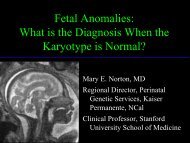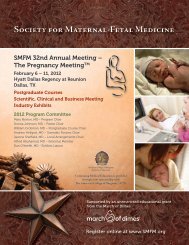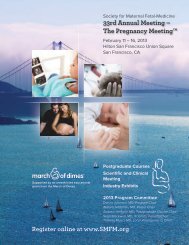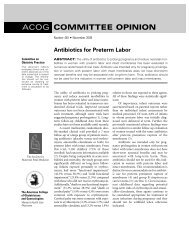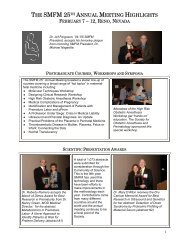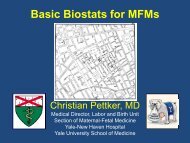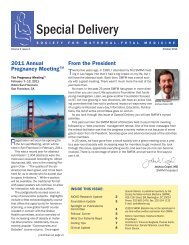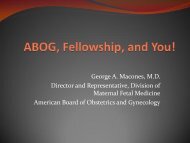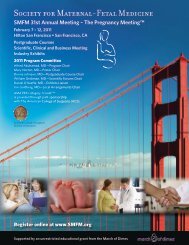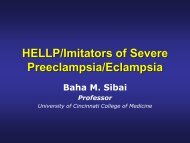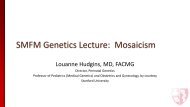Agenda for Computers in Perinatal Medicine meeting 2002
Agenda for Computers in Perinatal Medicine meeting 2002
Agenda for Computers in Perinatal Medicine meeting 2002
You also want an ePaper? Increase the reach of your titles
YUMPU automatically turns print PDFs into web optimized ePapers that Google loves.
Summary of Proceed<strong>in</strong>gs <strong>for</strong> the 2005 SMFM Annual Meet<strong>in</strong>g: Per<strong>in</strong>atal<br />
Epidemiology Scientific Forum<br />
Topic: Methodological Controversies <strong>in</strong> Obstetric Cl<strong>in</strong>ical Research<br />
Course Description (as described <strong>in</strong> the meet<strong>in</strong>g program): The focus of this<br />
scientific <strong>for</strong>um will be two common areas of controversy <strong>in</strong> cl<strong>in</strong>ical research: stopp<strong>in</strong>g<br />
cl<strong>in</strong>ical trials and select<strong>in</strong>g mean<strong>in</strong>gful & important primary outcomes. The Forum<br />
attendees will first review the operations of Data Monitor<strong>in</strong>g & Safety Committees<br />
(DMSC), highlight<strong>in</strong>g general topics of debate and conflict regard<strong>in</strong>g committee conduct.<br />
Second, specific examples will be presented <strong>in</strong> which a cl<strong>in</strong>ical trial was stopped based<br />
on a controversial decision by a DMSC. Po<strong>in</strong>ts and counterpo<strong>in</strong>ts regard<strong>in</strong>g the decision<br />
to cease each trial will be outl<strong>in</strong>ed. Third, the benefits, limitations and pitfalls of us<strong>in</strong>g<br />
surrogate or composite primary outcomes <strong>in</strong> cl<strong>in</strong>ical research will be presented,<br />
<strong>in</strong>corporat<strong>in</strong>g examples from the obstetrical literature.<br />
Moderator: David Stamilio, MD, MSCE, University of Pennsylvania Medical Center,<br />
Philadelphia, PA.<br />
Speakers:<br />
• Dwight J. Rouse, MD, MSPH, Center <strong>for</strong> Research <strong>in</strong> Women’s Health and<br />
Division of Maternal Fetal Medic<strong>in</strong>e, University of Alabama at Birm<strong>in</strong>gham,<br />
Birm<strong>in</strong>gham, AL.<br />
• Elizabeth Thom, PhD, George Wash<strong>in</strong>gton University Biostatistics Center,<br />
Wash<strong>in</strong>gton, DC.<br />
• Mark Klebanoff, MD, MPH, Director, Division of Epidemiology, Statistics, and<br />
Prevention Research, National Institute of Child Health and Human<br />
Development, Bethesda, MD.<br />
Proceed<strong>in</strong>gs:<br />
Dr. Stamilio provided a brief description of the course goals and <strong>in</strong>troduced the speakers<br />
and their respective topics. (5 m<strong>in</strong>utes)<br />
Dr. Rouse presented a lecture entitled “Data Monitor<strong>in</strong>g and Safety Committees<br />
(DMSC): Operations & Conflicts.” In this lecture, he described the purposes and<br />
functions of a DMSC. He described how to identify which studies need a DMSC. He also<br />
described who should comprise the DMSC and how the committee should be managed,<br />
<strong>in</strong>clud<strong>in</strong>g a charter, stopp<strong>in</strong>g rules, and guidel<strong>in</strong>es <strong>for</strong> adjudicat<strong>in</strong>g committee<br />
disagreements. (30 m<strong>in</strong>utes)<br />
Dr. Thom presented a lecture entitled “DMSC Controversies: When should a trial be<br />
stopped?” In this lecture, she described reasons <strong>for</strong> Data and Safety Monitor<strong>in</strong>g<br />
Committees to recommend stopp<strong>in</strong>g randomized cl<strong>in</strong>ical trials and highlighted the<br />
importance of establish<strong>in</strong>g reasons <strong>for</strong> stopp<strong>in</strong>g a trial be<strong>for</strong>e the planned number of<br />
patients have been recruited. She described some of the issues <strong>in</strong>volved <strong>in</strong> the decision,<br />
<strong>in</strong>clud<strong>in</strong>g statistical guidel<strong>in</strong>es. She illustrated her po<strong>in</strong>ts us<strong>in</strong>g three detailed examples<br />
drawn from the MFMU Network, <strong>in</strong>clud<strong>in</strong>g the Steroids Trial (RCT of s<strong>in</strong>gle course vs<br />
repeated weekly steroids <strong>in</strong> women at high risk of preterm delivery 24-31 weeks), the<br />
Progesterone Trial (RCT of weekly <strong>in</strong>jections of 17 α hydroxy-progesterone caproate vs



